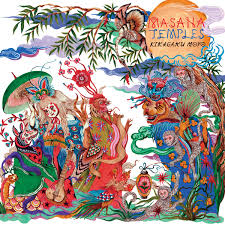After three bewitching albums of meandering, quintessentially Japanese psych-folk, Tokyo space cadets Kikagaku Moyo decamped to Portugal earlier this year to work with jazz musician and producer Bruno Pernadas. Masana Temples is the result, and whilst ‘focus’ isn’t necessarily something one requires, or even wants, from psychedelia, it’s the band’s most focused and cohesive record to date, not that that is exactly saying much.
A brief warning before we continue. If you’re one of those who have always taken John Lydon’s “Never trust a hippy” maxim as gospel, you are advised to bail out now. The ‘masana’ of the title is apparently a word invented by the band themselves to “express a Utopian feeling; an existence where everything can interact harmoniously and offer inspiration and understanding.” The album begins with an extended sitar jam. And their label is called Guruguru Brain. It really is like punk never ‘appened.
If you make it past the sitars though, a truly lovely experience awaits. Pernadas, as befits his jazz background, applies a subtle, understated hand to the mixing desk with plenty of space and none of the compression that ruins so many albums these days (yes I’m looking at you, Interpol and Spiritualized). The bass throbs tangibly, and vocalist Go Kurosawa frequently sounds like he’s whispering right in your ear. It sounds fantastic.
And the songs are more concise too, with the band adding a Krautrock dimension to their sound. ‘Fluffy Kosmisch’ describes itself far more eloquently than I ever could, whilst the motorik rhythms and tricksy time signature of ‘Nana’ come across like a more kawai version of King Gizzard, and ‘Majupose’ and ‘Orange Peel’ are Stereolab turning Japanese.
Those who miss the old, sprawling KM jams aren’t neglected however. ‘Dripping Sun’ takes in 70s porn soundtracks, lounge and heavy metal during its eight glorious minutes, whilst the seven-minute ‘Gatherings’ mixes sinister organ and chugging riffage before climaxing in an exhilarating Krautrock coda.
This may not be KM’s crossover album – Japanese language albums featuring sitar solos rarely trouble the charts – but it’s nevertheless a bold step forward for a band previously happy to sit in a psych-folk pigeonhole, and one that could well lead to future greatness.




